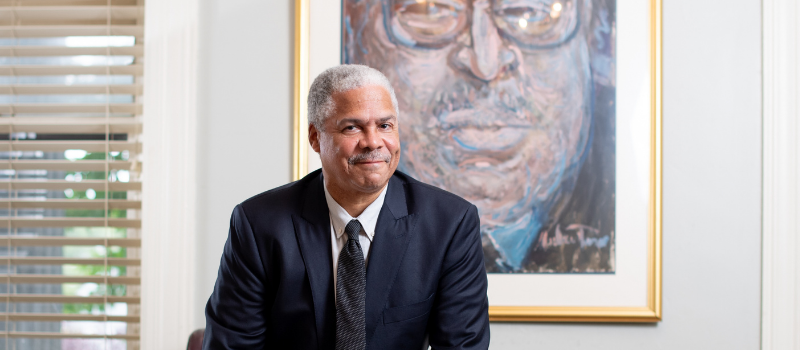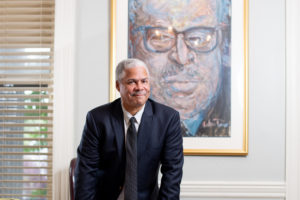
‘First of all, Servants of all’: Law school alumnus and zealous legal advocate leads Rhode Island Black Business Association
‘First of all, Servants of all’: Law school alumnus and zealous legal advocate leads Rhode Island Black Business Association

Casby Harrison III, a graduate of a David A. Clarke Law School predecessor, Antioch School of Law (’82), was recently elected the Rhode Island Black Business Association (RIBBA) chairperson. Harrison opened his own law office, Harrison’s Law Associates, on Providence’s South Side in 1999 and has been a full-time lawyer for more than 40 years.
Harrison is known for his persuasive writing and zealous legal advocacy on behalf of his clients. He believes practicing law is an opportunity to help others confront their adversaries and, in some cases, to change people’s lives for the better. By starting his practice in an underserved neighborhood, he has sought a more significant opportunity to assist businesses and people– particularly those in the minority community.
“The opportunity to lead RIBBA is one significant way that I have fulfilled the credo of my Alpha Phi Alpha Fraternity: ‘First of all, servants of all,’” said Harrison. “The President & CEO of RIBBA, Lisa Ranglin, is one of the most dynamic leaders in my adopted home state of Rhode Island. It will be a pleasure to assist the Jamaican-born Ranglin, forged in the mold of Shirley Chisholm, to empower Black and brown businesses and help them grow.”
According to Harrison, RIBBA has a very successful emerging leaders’ program that provides coaching and mentoring for younger minority entrepreneurs.
“RIBBA has 600 members and represents 250 Black and brown businesses,” he said.
“From improving credit scores to serving as a conduit for requests for proposals between property developers, construction companies, shopping centers, state and municipal governments and minority-owned businesses–to scholarships for minority high school students going to college and advocacy at the State House on policy and legislative initiatives, RIBBA is a force to be reckoned with regarding equity for Black businesses, of which I am one.”
Within the past 30 days, RIBBA has secured a $1 million grant from U.S. Senator Jack Reed to purchase a new headquarters building. Harrison is already seen as a long-time leader in the community, and at age 65, he is mindful that he will be viewed as a role model: The board of directors has at least five members under age 35.
Harrison feels that UDC remains one of the best decisions of his life when reflecting on his career.
“I was drawn by the mandatory participation in legal clinics and the requirement, at the time in the summer of 1979, that all entering students had to reside in the home of a low-income family for the first two weeks of classes.”
“I recall the many and varied student caucuses and the absence of hyper-competitiveness between students as depicted in the Hollywood movie about Harvard called ‘The Paper Chase,” said Harrison, who also met his wife, Mary Sylvia Harrison, at UDC.
“Interestingly, Mary worked for Councilman David Clarke for two years in the early 80s before becoming mayor. Upon her graduation in 1981, she also received the Dean’s award for most outstanding student, worked closely with Edgar Cahn on his Native American and Time Dollar initiatives for several years, and maintained a close relationship with him until his passing.”
Harrison has had several opportunities to become a judge during his career but “always preferred the rough and tumble of civil rights litigation, free speech and the satisfaction of effecting change through one satisfied client at a time.”
He advises current UDC students to choose their own paths as well.
“If you don’t love what you are doing professionally, stop and find something you enjoy,” said Harrison. “And if you have ever wondered what it would feel like to be in awe of jurisprudential intellect and well researched legal writing, then read the late Honorable A. Leon Higginbotham’s ‘Open Letter to Justice Clarence Thomas From a Federal Judicial Colleague’ published in the Pennsylvania School of Law Review in November 1991. The footnotes are nothing short of fantastic.”
After 40 years of litigating on behalf of victims of employment discrimination, tragic accidents and broken contracts, Harrison still loves what he does.
“As a sole proprietor of my firm with one younger associate, I feel as free as any Black man could hope,” he said. “I have relaxed my work schedule to six hours a day, four days a week. At this pace, I can continue working for as long as any Supreme Court Justice and with just as much time off to enjoy my grandchildren, one of which is Casby Harrison V.”
To learn more about Casby Harrison, click here.